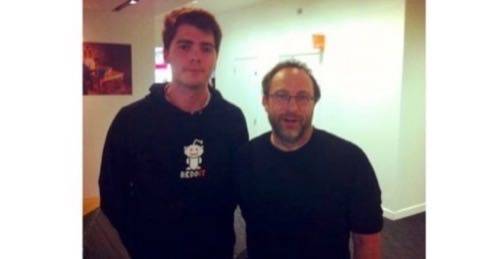
Richard O’Dwyer and Jimmy Wales
The United States government is currently trying to extradite a 24-year-old British citizen, Richard O’Dwyer, to the U.S. for creating a site that linked to – but never hosted – online videos. It’s another example of the federal government and Hollywood’s antiquated sharing-equals-piracy mentality and their ongoing efforts to criminalize the same kind of activity that happens on Google, Facebook and Twitter every day. The case is so outlandish that Wikipedia founder Jimmy Wales and various politicians and celebrities are stepping in to defend O’Dwyer.
In 2007 when O’Dwyer was 19, he created TVShack.net, a small website frequented mostly by Brits which acted as a crowd-sourced search engine for film, documentary and TV show content found on the Web. Users would post links to the content, some of which was illegally uploaded to the Internet, but the site itself did not host any videos; it was more of a forum like Reddit than a video platform like YouTube.
When sent a takedown notice for linking to copyrighted material over the three years the site was active, O’Dwyer said he deleted the offending post. That wasn’t good enough because in 2010, when O’Dwyer was 22, he was arrested in his Sheffield Hallam University dorm room by two local police officers, and two Immigration and Customs agents from the United States. O’Dwyer was charged with copyright infringement and conspiracy to commit copyright infringement.
Download the U.S. government’s court filing against Richard O’Dwyer and TVShack.net.
The U.S. deemed the $220,000 O’Dwyer made from advertising revenue on TVShack illegal and is currently trying to extradite him to the U.S., where he could receive a sentence of 10 years in a maximum security prison. In comparison, O’Dwyer’s case was investigated by British authorities and dropped, as linking to content is not illegal in the U.K. and is considered protected by free speech.
In an op-ed in The Guardian, Wikipedia founder Wales called O’Dwyer the “human face” in the battle of big content producers versus the general public. Unfortunately, O’Dwyer is the example Hollywood seeks to make in its fight against online piracy, even if its chosen example didn’t pirate any content in the first place.
Visiting TVShack.net today reveals the domain has been seized by the U.S., and the site now automatically redirects to an anti-pirating spot emphasizing lost jobs due to content piracy. However, the allegory in the YouTube video – of a man giving away DVDs for free on the street – doesn’t fit O’Dwyer’s alleged crime: While O’Dwyer’s website revealed the location of content which may or may not have been uploaded illegally, he didn’t actually hand out pirated content to users for free.
This fact has not been lost on the #SaveRichard campaign, an online campaign seeking to stop O’Dwyer’s extradition to the U.S. started by O’Dwyer’s mother Julia, a nurse to terminally ill children. Wales threw his support behind the campaign on June 24, in the form of an Op-Ed urging readers to sign a change.org petition, which at press time had 170,000 signatures.
The reason for O’Dwyer’s persecution over Google’s, Twitter’s or Facebook’s for sharing copyrighted content is unclear. Why the U.S. seeks to try him across the Atlantic, despite O’Dwyer living and engaging in an alleged criminal offense in the U.K., is also unclear. O’Dwyer’s lawyers have maintained the U.S. has no jurisdiction in the U.K.

Joining Wales in supporting the #SaveRichard campaign is the U.K. newspaper The Guardian, which called the whole thing “absurd”; Irish comedian and writer Graham Linehan, who called the case “blood boiling” on Twitter; British Labor Party politician Keith Vaz; Liberal Democrat president Tim Farron, who called the affair “ludicrous”; and Labor MP Tom Watson, among others.
As U.K. resident Mrs Fong pointed out on Twitter in the wee hours of June 25, “If we go down this road, we could in theory extradite almost every U.K. citizen for laws broken in other countries around the world.”

















